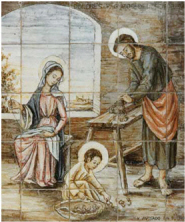|
Theology of the Heart- the Saints |
IN
ST. JOSEPH'S WORKSHOP
St. Josemaria Escriva

We do know that he was not well-to-do: he was just a worker, like so
many millions of people throughout the world. He worked at the same
demanding and humble job which God chose for himself when he took
our flesh and came to live just like the rest of us for thirty
years.
The picture of St Joseph in The Gospels
Scripture tells us St Joseph was a craftsman. Some Fathers of the
Church add that he was a carpenter. When talking of the life of
Jesus, St Justin says that he made ploughs and yokes. Perhaps that's
why St Isidore of Seville concludes that St Joseph was a blacksmith.
In any event, he was a workman who supplied the needs of his fellow
citizens with a manual skill acquired through years of toil and
sweat.
The Gospels give us a picture of Joseph as a remarkably sound man
who was in no way frightened or shy of life. On the contrary, he
faced up to problems, dealt with difficult situations and showed
responsibility and initiative in whatever he was asked to do.
I don't agree with the traditional picture of St Joseph as an old
man, even though it may have been prompted by a desire to emphasise
the perpetual virginity of Mary. I see him as a strong young man,
perhaps a few years older than our Lady, but in the prime of his
life and work.
A great personality
You don't have to wait to be old or lifeless to practice the virtue
of chastity. Purity comes from love; and the strength and gaiety of
youth are no obstacle for noble love. Joseph had a young heart and a
young body when he married Mary, when he learned of the mystery of
her divine motherhood, when he lived in her company, respecting the
integrity God wished to give the world as one more sign that he had
come to share the life of his creatures. Anyone who cannot
understand a love like that knows very little of true love and is a
complete stranger to the christian meaning of chastity.
At work, every day
Joseph was, we have said, a craftsman from Galilee, just one man
among many. What had life to offer to someone from a forgotten
village like Nazareth? Nothing but work: work every day, with the
same constant effort. And at the end of the day, a poor little house
in which to rest and regain energy for the next day.
But the name Joseph, in Hebrew, means "God will add." God adds
unsuspected dimensions to the holy lives of those who do his will.
He adds the one important dimension which gives meaning to
everything, the divine dimension. To the humble and holy life of
Joseph he added — if I may put it this way — the lives of the Virgin
Mary and of Jesus, our Lord. God does not allow himself to be
outdone in generosity. Joseph could make his own the words of Mary,
his wife: "He has looked graciously upon the lowliness of his
handmaid... because he who is mighty, he whose name is holy, has
wrought for me his wonders."
An ordinary man on whom God relied
St Joseph was an ordinary sort of man on whom God relied to do great
things. He did exactly what the Lord wanted him to do, in each and
every event that went to make up his life. That is why Scripture
praises Joseph as "a just man." And in Hebrew a just man means a
good and faithful servant of God, someone who fulfils the divine
will, or who is honourable and charitable toward his neighbour. So a
just man is someone who loves God and proves his love by keeping
God's commandments and directing his whole life toward the service
of his brothers, his fellow men.
St Josemaria Escriva, Christ Is Passing By, "In Joseph's
Workshop", n. 40
This page is the work of the Servants of the Pierced Hearts of Jesus and
Mary